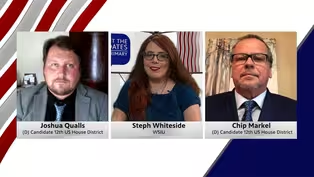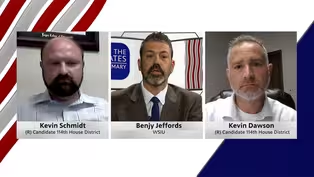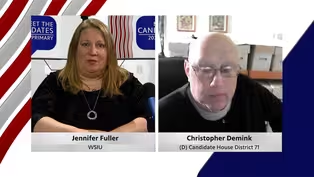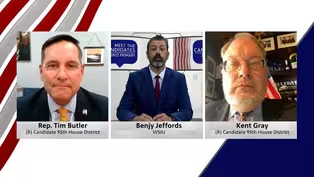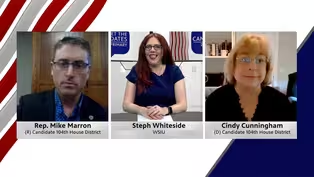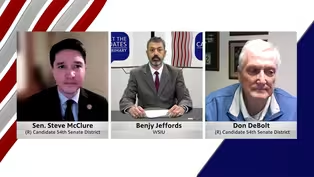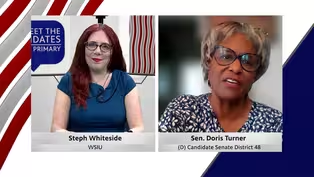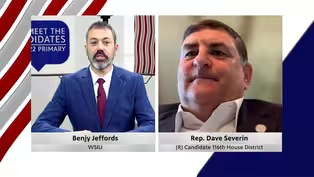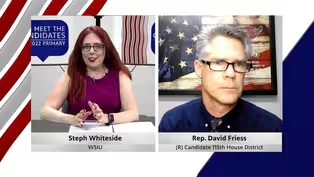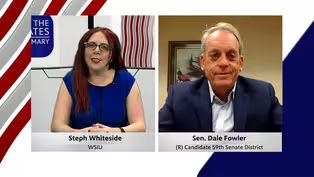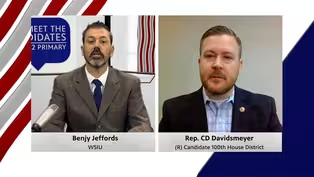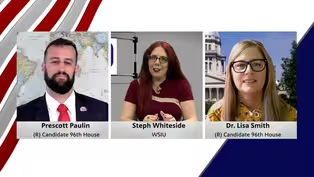Meet the Candidates
36th Senate District Primary Candidate Forum
6/9/2022 | 26m 29sVideo has Closed Captions
WSIU talked with 36th Senate District candidate Representative Mike Halpin.
Ahead of the June primary, WSIU talked with 36th Senate District candidate Representative Mike Halpin.
Problems playing video? | Closed Captioning Feedback
Problems playing video? | Closed Captioning Feedback
Meet the Candidates is a local public television program presented by WSIU
This series is produced in partnership with the League of Women Voters
Meet the Candidates
36th Senate District Primary Candidate Forum
6/9/2022 | 26m 29sVideo has Closed Captions
Ahead of the June primary, WSIU talked with 36th Senate District candidate Representative Mike Halpin.
Problems playing video? | Closed Captioning Feedback
How to Watch Meet the Candidates
Meet the Candidates is available to stream on pbs.org and the free PBS App, available on iPhone, Apple TV, Android TV, Android smartphones, Amazon Fire TV, Amazon Fire Tablet, Roku, Samsung Smart TV, and Vizio.
Providing Support for PBS.org
Learn Moreabout PBS online sponsorshipMore from This Collection
Meet the Candidates features interviews with candidates running for Illinois state, House and Senate races. Guests will discuss key issues impacting Illinois voters such as the economy, the environment, education and public health. This series is produced in partnership with the League of Women Voters.
12th U.S. Congressional Seat Primary Candidate Forum
Video has Closed Captions
Joshua Qualls and Chip Markel, running for the 12th U.S. Congressional Seat. (25m 21s)
114th Illinois House District Primary Candidate Forum
Video has Closed Captions
Dr. Kevin Schmidt and Kevin Dawson, running for the 114th House District. (25m 57s)
71st House District Primary Candidate
Video has Closed Captions
Ahead of the June primary, WSIU talked with Christopher Demink, running for the 71st House (21m 35s)
95th Illinois House District Primary Republican Candidates
Video has Closed Captions
Representative Tim Butler and Kent Gray, running for the 95th House District. (26m 58s)
104th Illinois House District Primary Candidates
Video has Closed Captions
104th House District candidates Representative (R) Mike Marron and (D) Cindy Cunningham. (26m 49s)
54th Illinois Senate District Primary Republican Candidates
Video has Closed Captions
54th Illinois Senate District Primary Republican Candidates forum. (25m)
48th Illinois Senate District Primary Democrat Candidates
Video has Closed Captions
48th Illinois Senate District Primary Democrat Candidates forum. (26m 46s)
116th Illinois House District Primary Republican Candidates
Video has Closed Captions
116th Illinois House District Primary Republican Candidates forum. (25m 9s)
115th Illinois House District Primary Republican Candidates
Video has Closed Captions
115th Illinois House District Primary Republican Candidates forum. (23m 14s)
59th Illinois Senate District Primary Republican Candidate
Video has Closed Captions
WSIU interviews Senator Dale Fowler from the 59th Senate District. (27m 29s)
100th Illinois House District Primary Republican Candidates
Video has Closed Captions
WSIU interviews candidate C.D. Davidsmeyer, running for the 100th House seat. (26m 9s)
96th Illinois House District Primary Republican Candidates
Video has Closed Captions
Candidates Prescott Paulin and Dr. Lisa Smith, running for the 96th House seat. (28m 45s)
Providing Support for PBS.org
Learn Moreabout PBS online sponsorship(upbeat music) - This is "Meet The Candidates."
And we are here with representative Michael Halpin, who is running for the 36th Senate district.
Representative Halpin currently holds the 72nd house seat.
I'm Benjy Jeffords, WSIU Public Broadcasting and the League of Women's Voters are pleased to host today's forum.
Primary candidates, Mike Thoms and Glenn Evan Sr declined our invitation to take part in today's event.
Thank you so much for joining us today.
- Happy to be here.
- Let's get started.
What is your number one priority if elected?
I know it can be hard to narrow it down to just one, but please let's just try to stick to one.
- Thank you, Benjy.
And thank you again for the invitation to be here today.
My number one priority as it has been for the six years I've been a representative is to maintain fiscal responsibility and stability for the state.
When I first came into office six years ago, under former governor Bruce Rauner, we had gone almost three years without a budget.
Citizens were hurting.
State vendors were refusing to do business with the state and some of our essential services were closing their doors.
I was part of a class that passed a budget over governor Rauner's objection, to bring that fiscal stability back to the State of Illinois.
And every year since we've passed a balanced budget that provides funding for the priorities of the citizens of Illinois.
That includes K through 12 education, mental health services, infrastructure, but most importantly, it just gives citizens and businesses the certainty of knowing that we can take care of our state budget, that we will reliably pass the state budget so that those individuals and those businesses can plan for the future.
That's my continuing commitment to the folks in my current house district.
And that's the commitment that I'd make to voters in the 36 Senate district as well.
- Thank you, and what would make you an effective lawmaker if you were elected?
- Well, one of the benefits I have is I'm from a downstate community with good relationships with both my Republicans nearby, as well as my fellow Democrats throughout the state.
I've had the opportunity to work with my colleagues across the aisle on agriculture issues, rural development issues, electrification issues, broadband issues, conservation issues.
But I also have that connection with some of my more suburban colleagues and colleagues that represent the City of Chicago.
And I have good relationships with them in, in an effort to compromise and try to do what's best for the entire state.
I'm committed to continuing that process as I represent more of Western Illinois.
And I think that my constituents will tell you here locally that I've done a good job, as far as bringing that, I guess, that kind of philosophy to state government.
- And the pandemic really exposed disparities in education funding.
What would you do to make sure schools in your district are able to meet the needs of the families and the students?
- Well, this is actually an area where I've already done it.
In my very first term.
We passed the evidence based funding model, which began the process of getting school funding away from simply based on property taxes.
For far too long, the state has failed to meet its obligations to our local school districts.
And so, those school districts have had to increasingly rely on property taxes to fund their programs.
With the evidence based model, there are actual measurements that we can use to determine outcomes, and we can make sure that we're committing additional state resources, regardless of how much property wealth is in a particular community.
I can say for our community here in the quad cities, our local school districts have seen tens of millions of dollars over the past six years.
And those increases are set to continue.
And what this program has and has allowed our local school districts to not increase property taxes, either to hold them steady, or in many cases actually reduce them and reduce the burden on taxpayers here in the area while still being able to provide the type of funding or the type of programs and type of education that our kids deserve.
So I plan on continuing to fund that evidence based model.
I plan on continuing to fund the Property Tax Relief Grant that's associated with the evidence based model to make sure our school districts are continuing to lighten that load on our local taxpayers.
- Excellent and the state budget is a major priority in Springfield.
Name three things you would prioritize.
- Well, the first is what we just talked about on the evidence based model, it's K through 12 education.
The second one would be higher education funding, which for many years saw decreases.
And we are now trying to recommit to our higher education institutions, the resources that they need, and third would be infrastructure development.
And the reason I name these three is because they're all long term investment strategies for the State of Illinois.
In the long run, investing in K through 12 and higher education and infrastructure, all return dollars to the State of Illinois in the form of economic development in the form of our students staying here in the state and finding jobs or creating jobs here in the State of Illinois and making sure that, generationally, we have families that are staying here in the State of Illinois.
I think we are really on a path to do this.
As I mentioned, we already increased the K12 education.
We passed a 49 billion capital infrastructure plan in 2019 that we're starting to see the dividends from.
And as I mentioned in this most recent budget, we increased higher education funding by 5%.
We need to do more in that area, but those would be altogether my three priorities for funding as we go forward.
- And speaking of the state budget, what would be three things that you would cut?
- Well, I think what we saw after the disastrous honor administration is that when you cut state employees and you cut services and you cut budgets to the bone, residents don't get the help that they need.
And so while I'm always looking for programs that aren't working, that we can eliminate, I think it's time right now to invest in these programs that have for too long been underfunded.
And so, there isn't a particular program that I have in mind that I would cut today because we've really swung so far to the other extreme that it's time to actually start funding these programs again and see which ones actually work.
One of the things that is important, is important to me again, is that K through 12 education for many years, we saw declines in state revenue towards K through 12 education.
And we saw how much it suffered.
Now, it's time to reinvest in those programs, make sure they work and reap the benefits from those programs that do work.
- Excellent and although the economy is recovering from the early stages of the pandemic, inflation is also on the rise.
What would you do to help Illinoisans who are finding their paychecks don't stretch as far as they did even a couple months ago?
- I couldn't agree with you more about inflation.
And this is another area where we've already done something.
I voted for the budget package in the house this year that provided the 1% grocery tax freeze, saving consumers across the state over the next year on their grocery bill.
I also support as part of that package freeze on the increase in the gas tax.
As you know, gas prices are going up and mostly out of our control, but we can do what little we can here in Illinois to try to ease that.
We also passed a property tax rebate that homeowners should be seeing in the middle to late fall or sorry, middle to late summer.
And we also pass an income tax rebate for families and their dependent children.
Now, alongside all those more immediate measures, we also passed an expansion to their earned income tax credit so that people in lower to middle class jobs will be able to keep more of their hard earned money going forward.
Now that is obviously a more long term plan, but it's something that we needed to do this year.
We worked very hard over the past, I guess, four years now to make sure that our budgets are in line.
And now, we found ourselves in a position where we had greater than expected revenues to the tune of more than 1.8 billion.
And as part of this budget package, it was our responsibility and our duty to give that back to the taxpayers in this time of rising inflation.
- A lot of people are pushing for renewable energy, especially with the rising price of oil.
At the same time, parts of Illinois have fossil fuel supplies that could provide energy for many years to come.
What would you do to ensure Illinois has a steady supply of energy and keep it affordable?
- What we've seen in Illinois is that the fossil fuel industry is starting to essentially phase itself out.
And so what we did with the Future Energy Jobs Act last year was provide for a pathway to continue to phase out that energy source while also providing for additional renewable sources, as well as nuclear energy, to make sure that we can meet the needs of business and our residents here in the state.
I think that was a pretty good compromise of providing funding for renewable resources, making sure we have enough of those supplies coming online to offset the decrease in coal fire plants.
But the reality is we have to start planning for the future as climate change affects the state and the country more and more.
And again, I believe that Future Energy Jobs Act struck the right balance, both on the renewable side, on the nuclear side, and even on the coal powered side, to make sure that we can provide a good energy future for the State of Illinois.
- And COVID 19 really changed the way people looked at healthcare and public health.
What would you do to make sure Illinois is prepared to handle future public health emergencies?
- Well, I'd wanna start by saying that I was very encouraged by what we did here in Illinois, especially Western Illinois, people in the quad cities, they were looking out for their neighbor, for their families, trying to do what was right to try to protect themselves and their community.
And the other thing, when it came to our community was our reliance on our local public health department.
They did a fabulous job in really unprecedented circumstances in getting information out to the public and making them sales available for questions, whether it would be about current mitigation strategies or upcoming vaccines, they really made an effort to educate and inform the public.
And I think that's the thing we need to focus on most if we were to go through something like this, again, in the future.
It's to maintain and open those lines of communications so that the public can get the best information they can in order to make decisions about how to protect themselves and their families.
This was a learning experience.
And I believe that our public health departments are really engaged in kind of reflecting on what worked and what didn't.
And so, I believe that they will be prepared going forward if something like this were to happen again.
- And gun violence continues to be a problem for communities across the state, what would you do to address the violence and how do you balance that with the Second Amendment rights?
- As you know, this has been very recently, a difficult issue to grasp.
And I think you're right.
When we see what the courts have said about the second amendment, we've got a responsibility to try to take action with that in mind.
And sadly, this ends up being more of an issue on the national level, because I do believe that our national leaders have to enact a policy that can apply across the board.
It's very difficult to be in a state here in the Midwest and try to go it alone.
And so I hope that our national leaders will reflect on this issue over the coming weeks and months, and try to come to a solution that strikes that balance that you refereed to.
- And criminal justice reform is a hot topic in Springfield.
Do you support changes to the system, including alternative sentencing, like drug courts, and what changes would you make to ensure safety while also making sure rehabilitation remains an option?
- I've been a long supporter of our drug courts, our mental health courts and our veterans courts.
These three topics are and have been a way to kind of divert people around the criminal justice system and make sure that they get the assistance that they need and deserve.
We ask our police officers these days to do too much, to respond to situations where really a mental health professional or a counselor would be more appropriate.
And so I've supported legislation that allows for that type of co-responder model.
I've also supported efforts for mental health services for the officers themselves.
In addition to training on how to deal with these situations, when these officers find themselves in them, I've also supported the use of body cameras here in the State of Illinois, which I think has done more to build trust between our law enforcement officers and the communities that they serve.
All these things together really are an effort to lighten the load of our officers and making sure that the people, the citizens in these situations are getting the help that they need so that they don't take that next step of committing a crime and finding themselves in the criminal justice system.
It's a very difficult and complicated equation.
But I believe that we are moving in the right direction.
- And recent events have shown how much Americans and Illinoisans can be impacted by global politics as evidenced by supply chain shortages and rising prices due to the pandemic and fighting in the Ukraine.
What would you do to try to help minimize the disruption of events like these on the people of Illinois?
- My straightforward answer is to bring jobs back from overseas.
I was a former staffer to Congressman Lane Evans who served in Western Illinois for about 20, 25 years.
And he was sounding the alarm on things like NAFTA and other bills and free trade agreements that ship jobs like those in Maytag and Galesburg overseas.
And at the time, he was correctly saying that, that these jobs are needed here in the United States, not only for the wellbeing of our workers, but because the products that we're making, they're just that much further away and more difficult to obtain.
And what the pandemic did was really expose our vulnerabilities to these supply chain disruptions.
If we were still making washers and dryers here in the United States, we wouldn't have the problems that we're seeing with inflation on those products.
And it doesn't just come from these durable appliances, it's really across the board.
And so, what we really need to do is refocus our energies on providing jobs here in the states.
One area where we are seeing some movement is an electric vehicle production.
I was a sponsor of a tax incentive to bring electric vehicle production here, as well as the microchip and semiconductor manufacturing that are component parts of those vehicles.
You know, when you combine the offshoring of jobs with the potential price gouging that we see now, and companies a able to say, oh, it's supply chain issues.
And that's what causing these increases.
We really need to get to the bottom of solving that type of corporate greed issue.
So bring those jobs back overseas, pay people a fair wage to make them and make sure that these companies are not exploiting the current inflation to make record profits.
- And what would you do to make sure the concerns of your constituents are occurred in Springfield considering the population density, skews toward the Northern part of the state?
- Well, the first step in that is making sure that you're listening to your constituents in the first place.
I very much have an open door policy when it comes to my constituents.
I meet with my constituents in my office when they have questions or concerns, but I also go out regularly knocking on doors, talking to them in their own homes or on their doorstep to hear the concerns that they have.
And a lot of people are more comfortable talking in that scenario.
And so I asked them, what do you think the state is doing right?
What do you think it's doing wrong?
Are you having issues with a state agency, how can I help you with that?
And people are not shy about telling you what they think.
And so I take that information.
And what I then do is talk to my colleagues, both Republicans and Democrats from downstate Illinois, to the suburbs, to the City of Chicago and make sure that they know what people in the quad cities are thinking.
And if I'm elected to the Senate, they will know what people in Western Illinois are thinking.
And I will make sure that they remember that the City of Chicago is not the only part of the state.
I've been successful with this in the past.
And I know I can be successful with this in the future, in the Senate.
- And what will you do to help ensure fair elections and access to voting for all the people in Illinois?
- Well, this is another area where we've already done it and I've already voted on it.
During the pandemic, it became clear that cramping everyone into election day voting was not the right solution.
And so we expanded access for vote by mail and absentee voting.
We expanded access for early voting to make sure that everyone had an opportunity to get their vote cast, even in the midst of a pandemic.
And what we saw is that people used that system.
People appreciated that system.
They could request a ballot, get it at home.
They could research the candidates as they looked at their ballot instead of potentially seeing candidates on the ballot for the first time and not knowing where they stood.
And so just because the pandemic is receding, doesn't mean we shouldn't give voters that opportunity to have that ballot access.
And so, I voted to keep those provisions in place.
So this year, as we approach the primary, you can already vote early.
You'll be able to do that in the general election as well.
You'll be able to request a vote by mail ballot, vote from the comfort of your own home and make sure that that ballot is sent back in and counted.
And you hear a lot of talk about election fraud from people that simply wanna make it more difficult for people to vote.
And I think that's the wrong direction to go in.
I think we need to expand access and not restrict it.
- And internet access is becoming increasingly necessary for people to work and go to school.
What would you do to make sure rural areas can access the high speed internet they need?
- This is probably one of the biggest things that I hear about when I'm traveling throughout the new 36 district and not just from individuals, small businesses, local governments, rural broadband access is critical.
And it's one of the things that leads to decline in those areas, if a small business doesn't have reliable access to internet, they're not gonna relocate to Western Illinois.
They're not going to create jobs there.
They're not going to create opportunities for the community.
They're not gonna put tax dollars back into the community.
What I did last year was sponsor an incentive for companies that commit to invest in wireless broadband internet in rural communities.
Unfortunately, we weren't able to get that into the budget for this year, but I plan to renew that effort if I'm elected to the Senate and hopefully make sure that we have equitable and reliable access to broadband throughout Western Illinois and all of downstate Illinois.
- And COVID 19 has depleted the state's unemployment fund.
What would you do to address this issue?
- Well, we already did, again, something in this most recent session, I supported a bill that would an appropriation that would pay back more than $2 billion to that fund.
And then what it would allow is for management and employee representatives to get together and decide how to move forward in bringing that in unemployment trust fund balance back to where it needs to be.
It was over the past 18 months, it was unprecedented into how much we had to tap into that fund.
We did need to borrow some money that was made available from the federal government.
And as I said, I'm very happy to say we've been able to repay a majority of that back.
And now, as we see business starting to improve, and the economy improving here in the State of Illinois, it'll be up to business and labor to best decide, with our oversight, how to move forward with making sure that fund is there for when the next economic crisis hits.
- And Illinois has some of the highest property taxes in the country.
What would you do to provide relief to homeowners in the state?
- Well, one of the things I had mentioned earlier was that K through 12 education funding is essential to, and is intertwined with property tax relief in the state.
60% thereabouts of your full property tax bill is actually your local school district.
Now it varies, but it's close to 60%.
What we've done with evidence based model again, is make local school districts less reliant on property taxes.
And it increases the responsibility of the state to provide that funding.
There's aspecific program called the Property Tax Relief Grant that is given to school districts in exchange for them lowering their property tax rates.
Many schools have already benefited from this program.
And many local taxpayers have benefited from the program.
What we need to do is invest additional money into that program so that more school districts and more taxpayers can benefit.
I believe that increasing state funding to our K through 12 system is a single most responsible way and most effective way to lower our property tax bills overall.
- We have just enough time for one more question.
Social services are another area that is seen funding depleted during the pandemic.
What would you do to make sure Illinoisans can get the help when they need it?
- Yeah, this is all a function of our budget and making sure that we're passing budgets on time and in full, the pandemic put people out of work.
And we had fortunately had an unemployment system that was able to handle that.
Certainly not perfectly, but it's softened the blow with our state vendors that provide these services.
We were making sure throughout this pandemic that they were getting paid by the state in a timely manner.
When I first took office, our bill back log was up to 18 months.
A vendor could wait up to 18 months to get paid.
We're now get paying our vendors within two weeks.
And we were well within 30 days of payment throughout this COVID 19 pandemic.
So when these vendors that provide the services can responsibly and reasonably rely on the state to make their payments, they can continue to offer those services without having to worry about getting paid.
And when they can offer those services, the people in the State of Illinois that need those services can receive them.
So it's all about budgeting responsibly, paying our bills responsibly and making sure that everyone in the chain can rely on those payments being made.
And I'm committed.
As I mentioned right off the top, I'm committed to maintaining that budget stability and that fiscal responsibility going forward if I'm elected to the Senate.
- Well, we are out of time.
So thank you so much for joining us representative and thank all of you for tuning in, for "Meet The Candidates" for Senate district 36 with representative Michael Halpin.
Tune in next Thursday at 7:00 PM for more.
(upbeat music)

- News and Public Affairs

Top journalists deliver compelling original analysis of the hour's headlines.

- News and Public Affairs

FRONTLINE is investigative journalism that questions, explains and changes our world.












Support for PBS provided by:
Meet the Candidates is a local public television program presented by WSIU
This series is produced in partnership with the League of Women Voters

